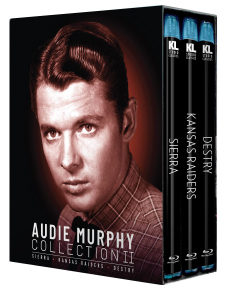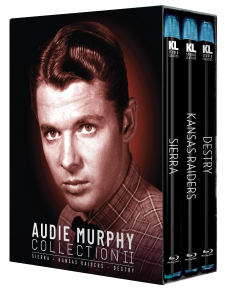Audie Murphy Collection II (Blu-ray Review)

Director
Alfred E. Green/Ray Enright/George MarshallRelease Date(s)
1950-1954 (July 18, 2023)Studio(s)
Universal-International (Kino Lorber Studio Classics)- Film/Program Grade: See Below
- Video Grade: A-
- Audio Grade: A-
- Extras Grade: B-
Review
Kino’s Audie Murphy Collection II offers another round of Westerns starring the World War II hero-turned movie actor. All three pictures are pretty good.
Sierra (1950) was just the second film Murphy made under a seven-year contract with Universal-International, and just his third starring film though Murphy gets second billing here under Wanda Hendrix, Murphy’s actress-wife during production.
The picture begins well with Riley Martin (Hendrix) lost in the High Sierras when she comes across Ring Hassard (Murphy), who lives in a secluded, even hidden log cabin deep in the mountains with his father, Jeff (Dean Jagger). Jeff is wanted for a murder he did not commit, and for years they’ve lived alone, catching and breaking wild horses. Riley’s presence threatens Jeff’s freedom, the two men fearing word will get around and the law will soon be storming their cabin. However, before they can decide what to do about Riley, Jeff has an accident with a wild horse, breaking his back.
Mountain man Lonesome (Burl Ives), their only neighbor, insists Jeff needs professional medical care, so Ring reluctantly agrees to ride into the nearest town to fetch a doctor. Without money, Ring brings several horses to sell, but outlaw Big Matt (Richard Rober) steals the horses and when Ring steals them back he has Ring arrested.
The picture starts out really well, promising a story about a young man cut off from society most of his life, whose father has instilled a deep distrust of the law and people generally. After Jeff is severely injured, he regrets going too far cultivating Ring’s distrust of society and its laws, but it may be too late. Unfortunately, the film then gets severely bogged down in various subplots: the business with Big Matt and the horse-stealing (any guess who really killed the man Jeff is accused of murdering years before?). For a reel or so, Sierra becomes a courtroom drama, with Riley no less turning out to be a pioneering female attorney. Burl Ives sings too many songs, including one where he literally sings Ring’s jailer (Gregg Martell) to sleep. The screenplay should have stuck more with the relationship between Ring and Jeff, with Riley acting as a catalyst.
Wanda Hendrix had a mostly unremarkable career and is forgotten today, but she’s quite good as Riley. Murphy’s PTSD, which reportedly including him threatening her with a gun, ended their marriage before Sierra even went into release. The production itself was also troubled: a flash flood destroyed sets, Hendrix suffered from a broken foot and altitude-related illnesses on location, where four horses died filming a stampede scene, and Murphy’s PTSD was compounded by ulcers and other ailments.
Kansas Raiders (1950) is a pretty solid piece of Western action-melodrama. It’s not exactly ambitious, but delivers what it promises. Jesse James (Murphy) and his nebulous gang, including brother Frank (Richard Long), Cole and Jim Younger (James Best and Dewey Martin), and Kit Dalton (Tony Curtis, who as “Anthony Curtis” has a tiny part in Sierra), arrive in Lawrence, Kansas, shortly after the Battle of Gettysburg, hoping to join up with Quantrill’s Raiders.
They meet Quantrill (Brian Donlevy) himself, and he takes a liking to Jesse after he proves his mettle in a fight instigated by Quantrill’s third-in-command, Tate (David Bauer), with Jesse shooting him dead. Quantrill, a self-styled Napoleon, impresses Jesse with his talk of winning the war once the fighting moves west, though his mistress, Kate Clarke (Marguerite Chapman), is much more cynical, seeing Quantrill’s Raiders for what they are, a gang of thugs, pillaging and looting for themselves, and not on behalf of the Southern Cause.
Jesse’s friends also realize this after the first raid on a farmhouse, where the all-civilian cowhands are gunned down with impunity. Jesse himself begins to have his doubts, but his devotion to father-figure Quantrill is unshakable—at least until his Raiders take part in the infamous Lawrence Massacre.
The picture’s excellent cast helps. Donlevy and Murphy are well-cast, as are Jesse’s friends, most Universal contract players on the ascent. Only Chapman seems out of place, as a woman who kind of falls for Jesse, because she’s seven years older than Murphy but looks much older, almost old enough to play his mother. Further, both Murphy and Donlevy were fairly short, each around 5’5” while Chapman appears at least several inches taller. In one ill-chosen angle, a close-up of Murphy and Chapman, her head appears 30% larger than Murphy’s!
The movie deftly avoids Production Code restrictions. Jesse is capable of killing outright when threatened, too quick to use his gun in a fight, but neither he nor any of his friends are shown actively participating in any civilian killings. Quantrill is depicted as willfully ignorant of what his men are really up to, and they clearly are using him to justify their brutality. In so doing, the writers are able to portray Quantrill is moderately sympathetic and allow Jesse and his gang to “ride off into history” at the end.
Destry (1954) is, of course, a remake of Destry Rides Again (1939), the Western comedy classic starring Marlene Dietrich, James Stewart, and…Brian Donlevy. The 1954 film with Murphy is an almost-but-not-quite scene-for-scene remake, and both pictures were directed by the same man: George Marshall.
In the remake, Decker (Lyle Bettger, in Donlevy’s part) all but owns the wide-open town of Restful, his enterprise operating out of a saloon where his girlfriend, Brandy (Mari Blanchard, in Dietrich’s part), is the star attraction. After ordering Curly (George Wallace) to gun down honest Sheriff Bailey (Trevor Bardette), Decker, in cahoots with corrupt Mayor Sellers (Edgar Buchanan), appoints town drunk Rags Barnaby (Thomas Mitchell) as the new sheriff. At gunpoint the meek local doctor, Curtis (Wallace Ford), goes along with Decker’s claim that the sheriff died of a heart attack.
But Rags, a former deputy, sobers up and sends for Tom Destry (Audie Murphy, in Jimmy Stewart’s role), son of a famous lawman. When Destry arrives, however, Rags is shocked to learn Destry’s son abhors violence and refuses to even wear a gun. Decker and his gang are delighted by Destry’s milquetoast ways—he even prefers milk to whisky. Destry is teased mercilessly and Rags goes back to the bottle. Is there any hope for Restful’s honest citizenry?
As remakes go, Destry is surprisingly good. I’d not seen Destry Rides Again in 25 years, yet immediately recognized many moments from that original redone here, most of it equally well. Murphy is quite good as Tom Destry; much of the time he’s playing the same scenes with the same dialogue Jimmy Stewart enacted 15 years earlier, but Murphy never imitates him—he’s always playing the character as Audie Murphy, not Stewart. Indeed, while in 1939 Stewart was not yet established at all as a Western movie star, Murphy’s clean-cut Western hero was already embedded in popular culture and a perfect fit for the part.
The supporting cast is good, too: Bettger, Mitchell, Buchanan, and Ford, along with Mary Wickes as Ford’s henpecking wife (roles played in the original by Mischa Auer and Una Merkel; Ford is superior to Auer), as is Alan Hale Jr. as the two-fisted cattle rancher initially mistaken for Destry.
The remake’s only big stumble is Mari Blanchard, a weak substitute for Marlene Dietrich. Known for playing sultry femme-fatale parts including, not long before this, the Queen of Venus in Abbott and Costello Go to Mars, Blanchard is clearly giving her all, and apparently that’s her real singing voice in the (too) many musical numbers, but she’s no Dietrich. No one was.
But the film is a polished, handsome production. Clearly Universal recognized this had breakout potential more than the usual Audie Murphy programmer and allocated a larger than usual budget, certainly well in excess of $1-1.5 million. It still works and Murphy is memorable.
SIERRA (Film Grade): B-
KANSAS RAIDERS (Film Grade): B+
DESTRY (Film Grade): B+
Kino’s Audie Murphy Collection II gives each of the three films its own Blu-ray disc and case. Sierra and Kansas Raiders are in three-strip Technicolor and presented in their original 1.37:1 standard aspect ratios. Both look splendid, with Kansas Raiders given the slight edge picture-wise. Destry was shot in Eastman Color (original prints by Technicolor) and presented in cropped 2.00:1 widescreen. U-I liked this uncommon spherical format, using it well into the early-1960s though the framing looks a mite cramped at times here. Shot in 1954, well before the dust had settled on screen shapes, it certainly was shot with cropping in mind, but perhaps not framed for such an extreme screen ratio. It looks fine, however, though process shots (such as dissolves) are on the grainy side. All three pictures are presented in DTS-HD Master Audio (2.0 mono) and supported by optional English subtitles. Region “A” encoded.
Supplements are limited to trailers for all three films, trailers complete with text and narration; and new audio commentaries by Toby Roan (Sierra), C. Courtney Joyner & Henry Parke (Kansas Raiders), and Lee Gambin & Gary Frank (Destry).
Audie Murphy Collection II is a sold triple-bill of Western titles that also showcase Murphy’s strong appeal as a Western star. Highly Recommended.
- Stuart Galbraith IV

